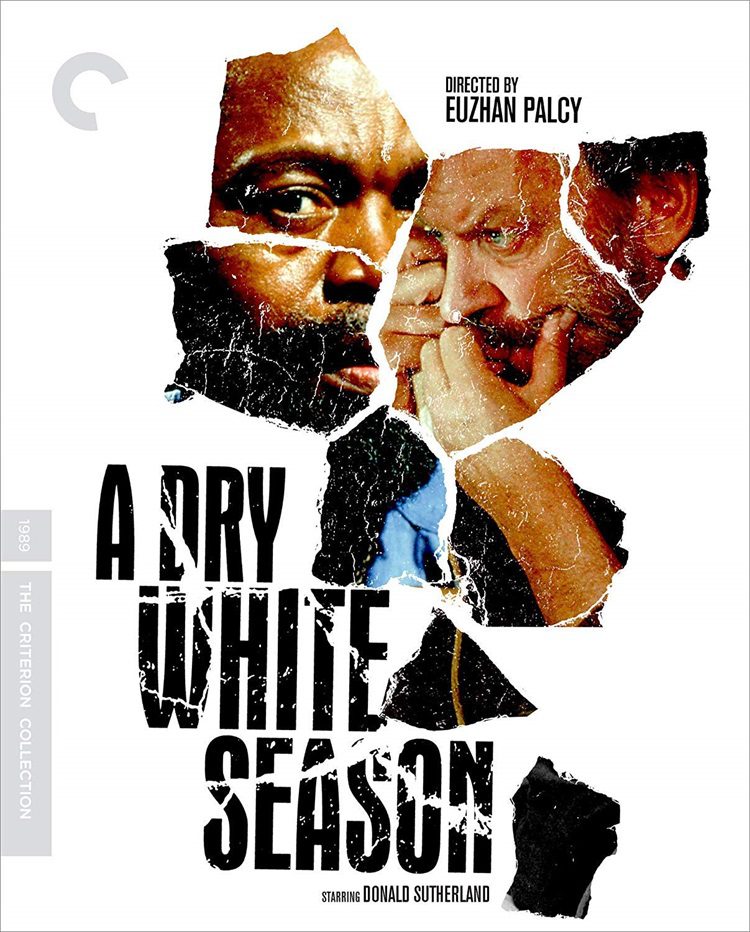
Racism is one those things that just doesn’t seem to go away. Every day you turn on the news to find more unarmed black men being shot by white cops; white people calling the police on innocent black people, and the underestimation of Black Lives Matter. Unfortunately, it has gotten much worse, especially ever since an orange someone was elected President. The violent consequences of prejudice is mostly directed to the wrong groups, and director Euzhan Palcy’s 1989 film, A Dry White Season, shows how that hate is definitely universal, meaning that it doesn’t just happen in the movies.
Based on the book by Andre Brink, the film takes place in South Africa in the late 1970s, where white schoolteacher Benjamin Du Toit (the great Donald Sutherland), living in Johannesburg, remains naive and unaware about the savagery and tragedy that befalls upon his black countrymen until a wave of brutal violence comes crashing in on his gardener Gordon (Winston Ntshona). Gordon’s son Jonathan is first arrested and brutally whipped. When a protest goes horribly wrong, Jonathan is arrested again and taken to a jail where he eventually dies, which understandably sends Gordon over the edge. He tries to find his body and what exactly happened to him, which leads Gordon himself to be viciously tortured and killed by sadistic and lawless policemen. With this, Benjamin has to make a dire choice, either continue to ignore what’s really going on or seek justice, even if it eventually threatens his life and the lives of his wife and children.
Although it has a few flaws, I was instantly struck by the immediacy of the story and how Palcy tells it like it is. When it comes right down to it, racial violence takes place all over the world. It doesn’t just happen to a certain demographic; it can involve everyone and everything. The violence depicted in the film is obviously not an easy watch, but it is used to prove a point. It’s not always subtle, but then again, that’s the terrible reality of the world we still live in.
Palcy gets amazing performances from not just Sutherland and Ntshona, but also Janet Suzman (Susan, Ben’s wife), Zakes Mokae (Stanley, the friend of Gordon’s family), a sheer villainous Jurgen Prochnow (Captain Stolz), Thoko Ntshinga (Emily, Gordon’s wife), Susannah Harker (Suzette, Ben’s daughter), and Rowen Elmes (Johan, Ben’s son). There is also Susan Sarandon in a great supporting turn as news reporter Melanie Bruwer, and in a standout role, the legendary Marlon Brando, who earned an Oscar nomination as Ian McKenzie, the lawyer that Ben seeks help from. Brando makes the most of his brief appearance, and proved that although he was definitely considered ancient history, was still a compelling screen presence.
As usual, Criterion does justice by giving this somehow-neglected film a crisp new 4K restoration. The great new supplements include a new interview with Palcy by film critic Scott Foundas; Five Scenes, a new video program featuring Palcy; a 1989 interview with Sutherland; an excerpt from a 1995 interview Palcy conducted with Nelson Mandela; and footage of Palcy receiving the highest distinction for foreign dignitaries at the 2017 South African National Orders awards. There is also a great new essay by filmmaker and scholar Jyoti Mistry.
A Dry White Season is truly gripping cinema with important and timely social themes that are all too real. This film couldn’t be more prevalent, especially in today’s increasingly grim political climate. Overall, I think this is a good addition to Criterion’s ever-growing collection.